Easter

It was five years ago now. I had recently finished a few week stay in the ICU, more than two months in the hospital, and more than one conversation between my parents and doctors about whether I would pull through. Still, I had made it, and after several months of regular home nurse visits, fentanyl patches, dilaudid pills, and 12 hours a day on an IV for liquid and nutrition, I was stable but still far from recovered.
The Saturday before Easter was sunny and unseasonably but appropriately warm. My mother and I took a walk outside, over a mile, the furthest I had gone in nearly five months.
“Wouldn’t it be poetic,” I asked, “If suddenly this whole illness, everything that went wrong in the hospital, all made sense tomorrow on Easter?”
“Hunny,” my mom responded kindly, “I think that’s a lot of pressure to put on the pastor. Don’t you?”
The next day was seasonably and appropriately repetitious. I heard nothing new. The same Easter story that had been read for centuries on centuries was read again. I received no specialized message from the divine about my own pain and struggle. That morning, I realized that might be the point.
Jesus came to make resurrection mundane.

We call it Holy Week. But it was a terrible week.
His trial reeked of injustice. His own disciple sold him out for a few pieces of silver, betrayed him with a kiss … and hung himself.
As he was arrested, one of his closest friends disregarded all his teaching on love, pulled out a knife, and cut a guy’s ear off. (Jesus called him out … and healed the other guy). A lot of the stuff that happened that first holy week was pretty unholy.
Once arrested, he was passed back and forth between politicians and bureaucrats. There was Caiaphas the priest, the Sanhedrin council, Pontius Pilate, the crowd — everyone seemed to want him dead, but no one wanted blood on their hands. Even Pilate washed his clean.
They had all kinds of accusations. Insurrection. Inciting a riot. Conspiracy. Terrorism (plotting to destroy the temple). Blasphemy.
But all he did was love. And heal. And give people hope.
Despite any substantial evidence, witnesses, or signs of any crime committed, he was pronounced guilty and sentenced to die.
As he awaited his fate, he was bullied, interrogated, harassed, tortured, beaten to a pulp. The authorities humiliated him and stripped him naked. They mocked the claims of his divinity, ramming a crown of thorns onto his head and wrapping him in a royal purple robe as they laughed.
And so it went. This man who many believe was the holy one that the prophets spoke of, the long-awaited Messiah, God incarnate, love with skin on— was executed, brutally. He died with his body convulsing as his lungs collapsed, with vultures swarming overhead, hoping to clean up after the execution. There is nothing more evil than what happened that “Good” Friday.

This is Holy Week, the most sacred time of year for Christians. It is the time they mark the betrayal, trial, and crucifixion of Jesus, and a week that culminates in Easter Sunday, the day Christians believe Jesus rose from the dead. So what do colored eggs have to do with anything? Let us Egg-‘Splain …
Q: Is Holy Week really a whole week? I only know about Good Friday and Easter Sunday.
A: Holy Week is the entire week between Palm Sunday and Easter Sunday. Not a whole lot happens on Monday and Tuesday, but some Christians mark the crucifixion on Wednesday, and some celebrate Maundy Thursday, the day of the Last Supper, Jesus’ final Passover meal with his disciples. It is sometimes celebrated with a foot-washing ceremony, a tradition beloved by Pope Francis, and a “Pascha” or “Paschal” meal, derived from the Jewish Passover Jesus would have known. Then comes Good Friday, Holy Saturday, and Easter Sunday. Fun fact: Not all American Christians greet each other with “Happy Easter.” To many evangelicals, the day is “Resurrection Sunday,” in part because they believe the word “Easter” has pagan roots.
Q: What is so “good” about Good Friday, the day Jesus was horribly tortured to death?

If you listen, each bucket has its own special sound. First are the empty buckets and their muted ting of dripping sap falling straight to the galvanized steel bottom. Next is the dop that reverberates from the slightly sweet drop running off the spile to a thin layer of liquid below. But it is the soft, and all too rare and timeless plop that I wait for. That quiet plop (or sometimes plip) signals that over half of that the three-gallon bucket is full and the tap is giving in abundance.
There is a slight quickening of the heart when the bucket is heavy enough to need two hands to pull off the hook. Then an involuntary smile to hear the pitch of the shwoosh ascend as the smaller bucket presents it’s offering to the larger. But sometimes, before I touch the bucket at all, I stop and wait to hear what it has to say. Ting? Dop? Plip? Plop?
I look at the tree and then its neighbors. I strain to hear the rhythm of the buckets around me and wonder, what makes one tap run so well when others are nearly dry?
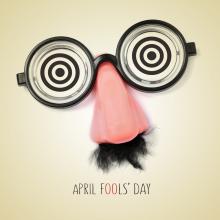
In 1 Corinthians 1:18-31 Paul says that “the message about the cross is foolishness to those who are perishing, but to us who are being saved it is the power of God.”
I can think of many times when I’ve felt foolish. Like forgetting someone’s name, or worse, calling them by the wrong name. Or when I read The Life of Pi and thought it was based on a true story because of the voice of the journalist.
The times when being foolish has really hurt, though, were when I placed trust in people only to be let down.
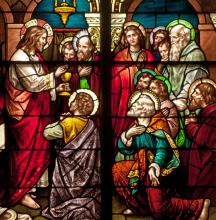
DURING THE EASTER SEASON, the first reading in our lectionary becomes, strangely, a New Testament reading. Most of the year, we immerse ourselves in the scripture we share with the Jews, but after the resurrection we traipse through the book of Acts. The claim being made is that the history of God’s chosen people continues in the history of the church. God is still working signs and wonders. And these include the sharing of goods in common, the fact that there are no needy people among us, bringing awe and distress among our neighbors, and a dawning kingdom brought slightly closer. Just like in our churches and communities today, right?
These Easter texts are also deeply sensual and material. God’s reign is imagined as a banquet with rich wines and marrow-filled meats. Love between sisters and brothers is like oil running down the head, over the face. The resurrection texts themselves insist on this point more emphatically than any other: Jesus is raised in his body. This is the beginning of God’s resurrecting power breaking out all over the creation God loves. What could ever be impossible after a resurrection? Our limited imaginations of the possible (Can we make budget? Can we get a few more votes on this bill? Can we improve lives in this neighborhood?) are shown for the bankruptcy in which they are mired. A new order is here. We pray, God, make our imaginations match the sensuousness, the materiality, the grandeur of what you have already accomplished and, more daringly still, what you promise yet to do.
Australian Catholic Archbishop Mark Coleridge shares a powerful reflection on the Lord’s Prayer:
Lent is not about giving up stuff.
Lent is about the preparation of our hearts for what God has done in Christ.

Wizards! Caspar! Melchior! Balthasar!
Why fly straight to Fox Herod? Through
Unbounded night—! Bringing only news
Ripe for bloodletting. How black a star
You follow. Herod knows. How bizarre
A kingly claim. Will he oppose? Muse
Like Mary? Ha—! Mothers’ sons lose
Heads to swords & axes. Herod bars
The throne to Jesus. Who kills first?


The seasonal items aisle in the grocery store is a work in progress. Stuffed bunnies are being replaced by garden gnomes. Cans of sunscreen will soon inhabit the shelves that displayed egg-coloring kits a few days ago.
Easter is over.
Well, not completely. Boxes of purple and yellow Peeps are stacked on clearance tables in the middle of the aisle. Chocolate rabbits are available for half-price.
And tombs are being emptied.

There’s an old hymn that many Christians have sung for nearly a century. “How Great Thou Art” celebrates the glory of God while considering, “all the works thy hands have made.” It reminds me of the psalm that reads, “The heavens are telling the glory of God; and the firmament proclaims his handiwork. Day to day pours forth speech, and night to night declares knowledge.”
Creation, therefore, is a witness to the wonder and awe of God. Although humanity has been given the honor of bearing God’s image, the earth shows God’s creativity and ingenuity. Over the years I’ve heard so many stories of people finding faith in God, not because of brilliant arguments, but because they are in awe of the complexity and glory of the created world.
But creation is not just a unique witness to God’s glory — it is, as the apostle Paul wrote, “groaning” waiting also for its redemption. This past Easter Sunday, Christians all over the world sang joyful songs of resurrection and renewal. Many of these songs proclaim freedom for all of creation — not just for humanity. One church I know of even sang “Joy to the World,” in celebration that the power of Christ’s resurrection extends “far as the curse is found.”
It’s hard to face, but humanity — image bearers of God — is largely responsible for destroying much of this great witness to God’s glory.


The women were there at the foot of Jesus’ cross.
The women were there when they laid him in the tomb.
The women walked through the desolate graveyard in the darkest hours of the night — the hours just before dawn, carrying sweet spices prepared to anoint Jesus’ dead body for proper burial. But they never got the chance.
They witnessed the earthquake, talked to the angel, and ran to the other followers announcing the resurrection of their beloved.
And Jesus’ mother, Mary, huddled in the upper room praying with the other women and the rest of the disciples in the days following the resurrection. Until that day, 50 days later, when tongues of fire fell on them all and Peter reminded the crowd of Joel’s ancient prophecy: “Your sons and daughters will prophesy.”
From the cross to the upper room, the women are lifted up! As the church stands in the light of Easter Sunday and now sets its face toward Pentecost, let us remember the women. And, as we do, let’s also remember the women in our pews and surrounding communities — the challenges, fears, and the very real dangers women face every day.


I used to hate Good Friday. Jesus dying a gruesome and unjust death didn’t seem particularly “good” to me. Even now, when I watch a Jesus movie like The Greatest Story Ever Told (or let’s be real: Jesus Christ Superstar), I find myself secretly hoping that someone in the crowd will say “wait a second! Just four days ago we really liked this guy. Crucifixion is a terrible idea, let’s go have Passover.” Mic drop.
The idealist and optimist in me would prefer to be reminded that the cross was empty, that Jesus was alive, to focus less on Good Friday and more on Easter Sunday. But I have come to appreciate the image of Christ on the cross much more now that I’m an adult and there are things that I have said and done in my life that deserve a reckoning. Jesus is there, gladly bearing my sin on the cross.
I’ve come to appreciate that there are so many broken and twisted places in this world that need a Redeemer. And Jesus is there, undoing the power of sin and evil on the cross.
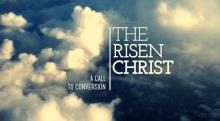
But the angel said to the women, "Do not be afraid; for I know that you seek Jesus who was crucified. He is not here; for he has risen, as he said. Come, see the place where he lay. Then go quickly and tell his disciples that he has risen from the dead, and behold, he is going before you to Galilee; there you will see him." Matthew 28:5-7
“Christ is risen!” That is the Easter greeting that Christians around the world have used for generations. It is one of my favorite parts of Easter — I love to hear the words “He is risen.”
But for so many of us, Easter is not just a religious holiday — it is a personal celebration and re-commitment. How do we personally experience the resurrection? Every year, as I hear and say “He is risen,” I remember that it’s not just a theological affirmation, but something I need personally.
Because I need — I think we all need — to remember and celebrate the hope that those words proclaim. “He is risen” is much more than an optimistic expression. It is not an empty platitude or wishful thinking, but the assertion of that in the midst of all the personal and collective pain, brokenness, injustice, and oppression that we see or experience, Christ is victorious. And we start over every Easter with a new affirmation and conviction of the hope that will always change both our lives and the world.
As I’ve been personally reflecting on the resurrection, I wanted to share an adaptation from the last chapter of my book, The Call to Conversion that explores what “Christ is risen!” meant to the earliest disciples. I hope that it will help you this Easter, as you celebrate the fact that “He is risen, indeed!” and reflect upon what this day of hope means for you.
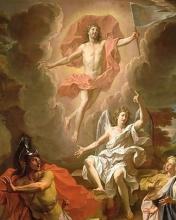
“On the third day, he rose again.”
But how that statement is interpreted is the source of some of the deepest rifts in Christianity — and a stumbling block for some Christians and more than a few skeptics.
Did Jesus literally rise from the dead in a bodily resurrection, as many traditionalist and conservative Christians believe? Or was his rising a symbolic one, a restoration of his spirit of love and compassion to the world, as members of some more liberal brands of Christianity hold?

Think Christmas, and carols come to mind: “Joy to the World,” “Silent Night,” “The First Noel.” But think of the other great Christian season — Holy Week and Easter — and most people draw a musical blank.
“The music written for Holy Week is some of the richest in our literature,” said David Ludwig, dean of artistic programs at Curtis Institute of Music in Philadelphia.
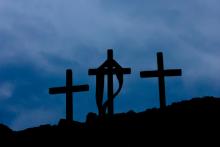
We love a good parade, don’t we? All that celebration, the noise, the crowds, the jubilation … It’s exciting and contagious and a little amazing how a good parade can impact us.
No one understood this like the Romans. These are the people of bread and circuses after all, and no one in the ancient world did empire better than the Romans. The Romans were incredibly good at subduing those people they had conquered. They celebrated the festivals of, raised up leadership from, and generally ingratiated themselves smoothly into the lives of those they ruled. But rule they did.
There certainly were people in Jesus’ time who thought Jesus’ work would be to overthrow the Roman oppressors — establish a political kingdom. Scholars surmise that Judas, the disciple who would betray Jesus to the empire, was one of these. Think of Judas as someone who saw the evils of the Roman Empire and desperately wanted Hebrew rule returned to the region. What we might today call a freedom fighter.
But throughout his ministry, Jesus talked explicitly about the Kingdom of God, the Kingdom of Heaven that is not of this world but is omnipresent, always at hand, constantly among us. And God’s. Period. A very different image of kingship, of dominion.